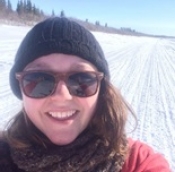
Erika Hille, MSc
Special Projects Coordinator/Librarian
Western Arctic Research Centre (Inuvik)
P: 867-777-3298 ext 207
E: Erika.Hille@auroracollege.nt.ca
Research Statement
I’ve worked in applied science and research for over ten years, with a focus on water resources. More specifically, I’m interested in what landscape-level factors control the hydrology and geochemistry of freshwater systems in Arctic regions. Along with scientists from the Water and Climate Impacts Research Centre (W-CIRC) in Victoria, BC, I’ve co-developed a research program titled “Impacts of Natural and Anthropogenic Disturbances on Tundra Upland Lakes” that looks at how recent wild fires, thaw slumping, and the construction of the Inuvik to Tuktoyaktuk Highway affect lakes in the upland region east of Inuvik. I’m also interested in how thaw slumping affects water runoff to Kugmallit Bay, which is the focus of my Beaufort Sea Coastal Restoration program. Finally, in collaboration with the NWT Geological Survey, I’m studying the role of latitude, seasonal variability, and surficial geology in driving the water quality of streams located along the Dempster and Inuvik-Tuktoyaktuk Highway corridor.
Before joining the team at the Aurora Research Institute, I worked at the Climatology Laboratory at York University in Ontario, and at W-CIRC at the University of Victoria. I currently represent the Aurora Research Institute on the Northwest Territories Regional Contaminants Committee, the Cumulative Impacts Monitoring Program, the Beaufort Sea Partnership, the Canadian Network for Northern Research Operators, and the International Network for Terrestrial Monitoring in the Arctic.
Current Projects
- Impacts of Natural and Anthropogenic Disturbances on Tundra Upland Lakes
- Beaufort Sea Coastal Restoration - Exploring the Potential for Using Indigenous Plant Species to Revegetate Coastline Affected by Permafrost Thaw Slumping
- Examining the Effects of Spring Snowmelt on the Geochemistry of Runoff from Thaw Slumps
Significant Contributions
- Hille E. Beaufort Sea Coastal Restoration Project 2018 Annual Research Update. Aurora Research Institute. Inuvik, NT.
- Hille E, Peters D, and Wrona F. In progress. Landscape-level factors driving the geochemistry of upland tundra lakes affected by permafrost thaw slumping, Inuvik region, NT, Canada.
- Michel J, Gareis J, Benson K, Owen C, and Hille E (editors). 2015. Compendia of Research in the Northwest Territories. Aurora Research Institute, Yellowknife, NT.
- Hille E. 2014. The effects of shoreline retrogressive thaw slumping on the hydrology and geochemistry of small tundra lake catchments. MSc Thesis, Department of Geography, University of Victoria, Victoria, BC.
- Hille E, Peters D, Wrona F, and Kokelj S. 2013. Catchment-level processes driving the geochemistry of small tundra lakes affected by shoreline retrogressive thaw slumping, Mackenzie Delta Uplands, NT. Oral presentation at the ArcticNet Annual Scientific Meeting, Halifax, NS.
- Hille E, Lin C, and Pokharel B. 2009. A comparison of the aquatic primary productivity of ponds located on serpentine and non-serpentine soils. Hidden Geographies 1:21-32.
- Hille E. 2008. The role of benthic algae in CO2 exchange from ponds in the Hudson’s Bay Lowlands. Honours Thesis, Department of Geography, York University, Toronto, ON.
